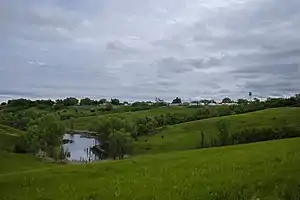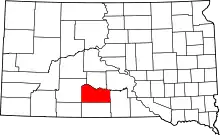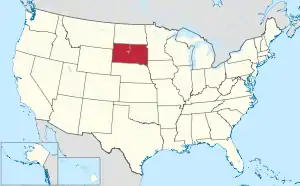Mellette County, South Dakota
Mellette County is a county in the U.S. state of South Dakota. As of the 2020 census, the population was 1,918.[1] Its county seat is White River.[2] The county was created in 1909, and was organized in 1911.[3] It was named for Arthur C. Mellette, the last Governor of the Dakota Territory and the first Governor of the state of South Dakota.
Mellette County | |
|---|---|
 White River from the West, the county seat | |
 Location within the U.S. state of South Dakota | |
 South Dakota's location within the U.S. | |
| Coordinates: 43.58°N 100.76°W | |
| Country | |
| State | |
| Founded | 1909 (created) 1911 (organized) |
| Named for | Arthur C. Mellette |
| Seat | White River |
| Largest city | White River |
| Area | |
| • Total | 1,311 sq mi (3,400 km2) |
| • Land | 1,307 sq mi (3,390 km2) |
| • Water | 3.6 sq mi (9 km2) 0.3% |
| Population (2020) | |
| • Total | 1,918 |
| • Estimate (2021) | 1,908 |
| • Density | 1.5/sq mi (0.56/km2) |
| Time zone | UTC−6 (Central) |
| • Summer (DST) | UTC−5 (CDT) |
| Congressional district | At-large |
Historically territory of the Sioux/Lakota peoples, 33.35 percent of the county's land is trust land associated with the Rosebud Indian Reservation in the neighboring county to the south. According to the 2000 United States Census, 52.2% of the population is Native American, mostly the federally recognized Sicangu Oyate (Upper Brulé Sioux) and the Rosebud Sioux Tribe, a branch of the Lakota people.
Geography
The White River flows eastward along the north boundary line of Mellette County. The Little White River flows northward through central Mellette County, discharging into White River. The terrain consists of semi-arid rolling hills, the northern portion dotted with ponds and small lakes. The area is mostly devoted to agriculture.[4] The terrain slopes to the northeast; its highest point is the SW corner at 2,779 ft (847 m) ASL.[5] The county has a total area of 1,311 square miles (3,400 km2), of which 1,307 square miles (3,390 km2) is land and 3.6 square miles (9.3 km2) (0.3%) is water.[6]
The eastern portion of South Dakota's counties (48 of 66) observe Central Time; the western counties (18 of 66) observe Mountain Time. Mellette County is the westernmost of the SD counties to observe Central Time.[7]
Major highways
Adjacent counties
- Jones County - north
- Lyman County - northeast
- Tripp County - east
- Todd County - south
- Bennett County - southwest (observes Mountain Time)
- Jackson County - west (observes Mountain Time)
Demographics
| Census | Pop. | Note | %± |
|---|---|---|---|
| 1910 | 1,700 | — | |
| 1920 | 3,850 | 126.5% | |
| 1930 | 5,293 | 37.5% | |
| 1940 | 4,107 | −22.4% | |
| 1950 | 3,046 | −25.8% | |
| 1960 | 2,664 | −12.5% | |
| 1970 | 2,420 | −9.2% | |
| 1980 | 2,249 | −7.1% | |
| 1990 | 2,137 | −5.0% | |
| 2000 | 2,083 | −2.5% | |
| 2010 | 2,048 | −1.7% | |
| 2020 | 1,918 | −6.3% | |
| 2022 (est.) | 1,892 | [8] | −1.4% |
| US Decennial Census[9] 1790-1960[10] 1900-1990[11] 1990-2000[12] 2010-2020[1] | |||
2000 census
As of the 2000 United States Census,[13] there were 2,083 people, 694 households, and 498 families in the county. The population density was 2 people per square mile (0.77 people/km2). There were 824 housing units at an average density of 0.6 units per square mile (0.23/km2). The racial makeup of the county was 44.74% White, 52.42% Native American, 0.10% Asian, 0.24% from other races, and 2.50% from two or more races. 1.68% of the population were Hispanic or Latino of any race.
There were 694 households, out of which 38.90% had children under the age of 18 living with them, 46.80% were married couples living together, 16.70% had a female householder with no husband present, and 28.10% were non-families. 24.20% of all households were made up of individuals, and 10.50% had someone living alone who was 65 years of age or older. The average household size was 2.94 and the average family size was 3.49.
The county population contained 35.30% under the age of 18, 7.50% from 18 to 24, 24.60% from 25 to 44, 19.40% from 45 to 64, and 13.20% who were 65 years of age or older. The median age was 32 years. For every 100 females there were 101.30 males. For every 100 females age 18 and over, there were 100.60 males.
The median income for a household in the county was $23,219, and the median income for a family was $25,221. Males had a median income of $17,989 versus $17,989 for females. The per capita income for the county was $10,362. About 30.40% of families and 35.80% of the population were below the poverty line, including 45.70% of those under age 18 and 21.90% of those age 65 or over.
2010 census
As of the 2010 United States Census, there were 2,048 people, 693 households, and 493 families in the county.[14] The population density was 1.6 inhabitants per square mile (0.62/km2). There were 838 housing units at an average density of 0.6 units per square mile (0.23 units/km2).[15] The racial makeup of the county was 54.1% American Indian, 39.7% white, 0.2% Asian, 0.1% black or African American, 0.2% from other races, and 5.6% from two or more races. Those of Hispanic or Latino origin made up 1.5% of the population.[14] In terms of ancestry, 25.6% were German, 8.4% were Irish, 6.1% were English, and 0.6% were American.[16]
Of the 693 households, 41.6% had children under the age of 18 living with them, 43.3% were married couples living together, 19.0% had a female householder with no husband present, 28.9% were non-families, and 24.7% of all households were made up of individuals. The average household size was 2.88 and the average family size was 3.38. The median age was 34.2 years.[14]
The median income for a household in the county was $34,055 and the median income for a family was $35,781. Males had a median income of $31,625 versus $30,956 for females. The per capita income for the county was $16,971. About 23.4% of families and 27.0% of the population were below the poverty line, including 40.5% of those under age 18 and 6.3% of those age 65 or over.[17]
Communities
City
- White River (county seat)
Town
Census-designated places
Unincorporated communities
- Mosher[4]
Townships
- Bad Nation
- Blackpipe
- Butte
- Cody
- Fairview
- Mosher
- New Surprise Valley
- Norris
- Prospect
- Red Fish
- Ring Thunder
- Riverside
- Rocky Ford
- Rosebud
- Running Bird
- Surprise Valley
Unorganized territories
- Cedarbutte
- Central Mellette.
Politics
Like most of South Dakota, Mellette County is solidly Republican. It has not been carried by a Democrat since Lyndon Johnson’s 1964 landslide, although Barack Obama came within six votes of doing so in the 2012 election.
| Year | Republican | Democratic | Third party | |||
|---|---|---|---|---|---|---|
| No. | % | No. | % | No. | % | |
| 2020 | 449 | 58.39% | 298 | 38.75% | 22 | 2.86% |
| 2016 | 402 | 58.86% | 238 | 34.85% | 43 | 6.30% |
| 2012 | 381 | 49.54% | 375 | 48.76% | 13 | 1.69% |
| 2008 | 445 | 52.79% | 373 | 44.25% | 25 | 2.97% |
| 2004 | 553 | 59.40% | 361 | 38.78% | 17 | 1.83% |
| 2000 | 495 | 67.53% | 222 | 30.29% | 16 | 2.18% |
| 1996 | 417 | 52.26% | 302 | 37.84% | 79 | 9.90% |
| 1992 | 417 | 49.58% | 277 | 32.94% | 147 | 17.48% |
| 1988 | 460 | 53.99% | 385 | 45.19% | 7 | 0.82% |
| 1984 | 616 | 66.45% | 303 | 32.69% | 8 | 0.86% |
| 1980 | 624 | 64.80% | 279 | 28.97% | 60 | 6.23% |
| 1976 | 508 | 53.53% | 429 | 45.21% | 12 | 1.26% |
| 1972 | 637 | 59.20% | 433 | 40.24% | 6 | 0.56% |
| 1968 | 611 | 55.70% | 407 | 37.10% | 79 | 7.20% |
| 1964 | 525 | 44.38% | 658 | 55.62% | 0 | 0.00% |
| 1960 | 774 | 60.28% | 510 | 39.72% | 0 | 0.00% |
| 1956 | 643 | 55.29% | 520 | 44.71% | 0 | 0.00% |
| 1952 | 787 | 69.40% | 347 | 30.60% | 0 | 0.00% |
| 1948 | 482 | 49.33% | 482 | 49.33% | 13 | 1.33% |
| 1944 | 544 | 57.02% | 410 | 42.98% | 0 | 0.00% |
| 1940 | 990 | 52.24% | 905 | 47.76% | 0 | 0.00% |
| 1936 | 711 | 46.56% | 808 | 52.91% | 8 | 0.52% |
| 1932 | 657 | 29.14% | 1,583 | 70.20% | 15 | 0.67% |
| 1928 | 943 | 50.13% | 927 | 49.28% | 11 | 0.58% |
| 1924 | 642 | 39.93% | 604 | 37.56% | 362 | 22.51% |
| 1920 | 533 | 63.53% | 261 | 31.11% | 45 | 5.36% |
| 1916 | 379 | 45.55% | 436 | 52.40% | 17 | 2.04% |
| 1912 | 0 | 0.00% | 320 | 53.96% | 273 | 46.04% |
See also

References
- "2020 Census Results". United States Census Bureau. Retrieved August 14, 2021.
- "Find a County". National Association of Counties. Retrieved June 7, 2011.
- "Dakota Territory, South Dakota, and North Dakota: Individual County Chronologies". Dakota Territory Atlas of Historical County Boundaries. The Newberry Library. 2006. Archived from the original on April 2, 2018. Retrieved March 30, 2015.
- Mellette County SD Google Maps (accessed 7 February 2019)
- ""Find an Altitude" Google Maps (accessed 7 February 2019)". Archived from the original on May 21, 2019. Retrieved February 7, 2019.
- "2010 Census Gazetteer Files". United States Census Bureau. August 22, 2012. Retrieved March 28, 2015.
- Map of Time Zone Line through South Dakota (accessed 30 January 2019)
- "Annual Estimates of the Resident Population for Counties: April 1, 2020 to July 1, 2022". Retrieved April 2, 2023.
- "US Decennial Census". US Census Bureau. Retrieved March 28, 2015.
- "Historical Census Browser". University of Virginia Library. Retrieved March 28, 2015.
- Forstall, Richard L., ed. (March 27, 1995). "Population of Counties by Decennial Census: 1900 to 1990". US Census Bureau. Retrieved March 28, 2015.
- "Census 2000 PHC-T-4. Ranking Tables for Counties: 1990 and 2000" (PDF). US Census Bureau. April 2, 2001. Archived (PDF) from the original on October 9, 2022. Retrieved March 28, 2015.
- "U.S. Census website". US Census Bureau. Retrieved May 14, 2011.
- "Profile of General Population and Housing Characteristics: 2010 Demographic Profile Data". US Census Bureau. Archived from the original on February 13, 2020. Retrieved March 12, 2016.
- "Population, Housing Units, Area, and Density: 2010 - County". US Census Bureau. Archived from the original on February 13, 2020. Retrieved March 12, 2016.
- "Selected Social Characteristics in the US – 2006-2010 American Community Survey 5-Year Estimates". US Census Bureau. Archived from the original on February 13, 2020. Retrieved March 12, 2016.
- "DP03 SELECTED ECONOMIC CHARACTERISTICS – 2006-2010 American Community Survey 5-Year Estimates". US Census Bureau. Archived from the original on February 13, 2020. Retrieved March 12, 2016.
- Leip, David. "Atlas of US Presidential Elections". uselectionatlas.org. Retrieved April 15, 2018.
Further reading
- Andrews, John (February 9, 2016). "A Strange Fascination". South Dakota Magazine. Part of a series on South Dakota counties.